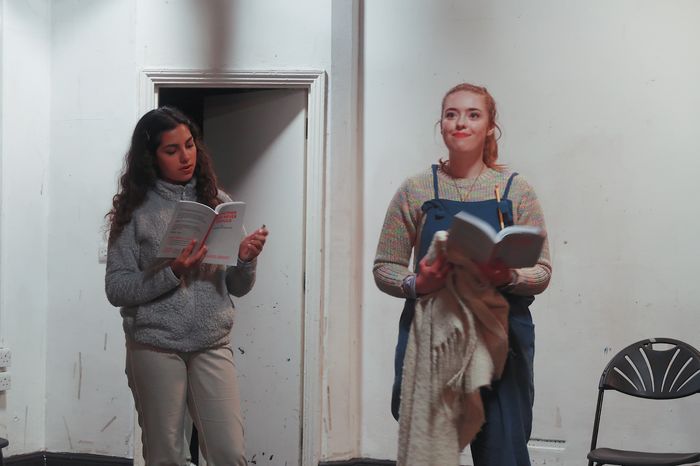Imagination and reality collide in ‘Playing Pretend’
A transportive but confusing journey into a world of imagination, nostalgia, and decay

When the lights dimmed and Playing Pretend began, I was thankful not to be sat at the end of the row. Three terrifying looking creatures began crawling onto the stage, hissing and apprehensively touching the audience as they went. Although creepy, it was powerful and the play began to feel incredibly immersive. The declaration that ‘We’re being watched’ gave a sense of metatheatricality. As an audience, we too were swept away into this disturbing mythical reality.
Playing Pretend is an original play by Jake Fenton that follows the characters of Teddy, Sammy and Jason who in their childhood escape to a world of imagination. When Teddy goes missing, the realm of reality for those left behind begins to fall apart, whilst their imaginary friends fight to break through the cracks into the real world. The writing was innovative and emotionally touching in exploring the fragility of adult life, focusing on the consequences for those left behind after a disappearance that is never resolved.
“How can the world ever feel as it did when the power of fantasy and escapism dwindles with age?”
There was a moment where the character of Sammy (Kiko Gomersall) declares to the audience that ‘this isn’t the world we thought it was’, and what had simply felt like a distorted fairy tale story became something much more — how can the world ever feel as it did when the power of fantasy and escapism dwindles with age? As the characters in this play matured, the actors were really able to showcase their talents. Gomersall was captivating, especially when addressing the audience directly. His grief and hopelessness at the loss of his friend felt human, and so did his anger at being the only one who stayed to deal with the aftermath.
Maddy Power put on an emotional performance as the character of Jason — who provided an interesting exploration into a kind of hopeless masculinity. Jason turns to drugs and alcohol to distract himself from the feeling of responsibility for the disappearance of Teddy, attempting to give his life the same magic it once had. Maddy’s performance combined with thoughtful characterisation enabled the audience to start to understand some of the pain behind his aggression.
The show was experimental with sound, and although there was clearly an intention of making this performance entirely immersive, the near constant music became jarring. Sometimes the sound felt a little too overpowering, distracting from the performances happening on stage, especially the tinny recordings of Teddy’s voice. On the whole though, the visuals of this world helped to create this vision of two worlds colliding — the fairies’ creepy smiles, movements, and laughter were especially powerful when they would, unknowingly to the other characters, be replicating their movements or attempting to break into their reality.
It was clear that this production placed much attention on the importance of physicality, aided by Ella Palmer’s strong work as movement director. There were visually striking moments where the creatures would stand almost as a mirror image of the other world, avoiding physical contact with the other, but replicating their body language completely. Lighting also helped create a sense of split reality; dark green light, representing the imaginative forest existing beneath the real world, would turn to a harsh white to create moments of exposure and an almost overwhelming sense of real life. This harsh reality powerfully reflected the vulnerability of the characters, now adults, who felt an absence of imaginative escapism to hide behind. Their disillusionment was built into the production’s set design, where various boxes, chains, and strewn furniture illustrated the loneliness of adulthood and the grief and guilt of losing a friend.
However, the ending of this play felt abrupt — questions were left unanswered and I couldn’t help but feel like the opportunity to develop the play further by bringing back Teddy or staging a real collision between these two worlds was passed up. Although this uncertainty felt part of the point of such a play, I couldn’t help wanting to understand where Teddy had gone; was he dead, or stuck in this world of imagination for good? For a play of such incredible performance and visual experimentation, I just wish I hadn’t left the theatre feeling so uncertain.
My Mother Said I Never Should is showing at the Corpus Playrooms, Wednesday 8th to Saturday 11th February, 9:30pm
 Music / The pipes are calling: the life of a Cambridge Organ Scholar25 April 2025
Music / The pipes are calling: the life of a Cambridge Organ Scholar25 April 2025 News / Candidates clash over Chancellorship25 April 2025
News / Candidates clash over Chancellorship25 April 2025 Comment / Cambridge builds up the housing crisis25 April 2025
Comment / Cambridge builds up the housing crisis25 April 2025 Arts / Plays and playing truant: Stephen Fry’s Cambridge25 April 2025
Arts / Plays and playing truant: Stephen Fry’s Cambridge25 April 2025 Interviews / Dr Ally Louks on going viral for all the wrong reasons25 April 2025
Interviews / Dr Ally Louks on going viral for all the wrong reasons25 April 2025






